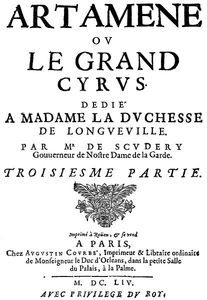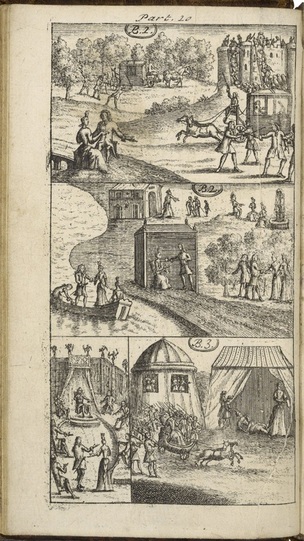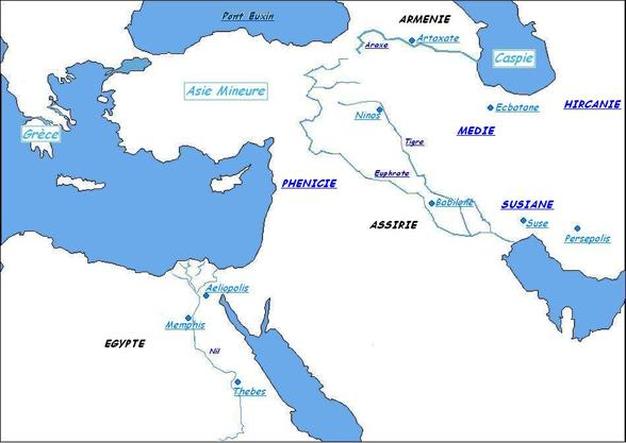About the Text

Madeleine de Scudery’s Artemenes, or the Grand Cyrus (French: Artamene ou le Grand Cyrus, formally titled Artamenes; or, the Grand Cyrus. That Excellent Romance) was written over a span of four years (1649-1653) and in its first edition, was 13,095 pages long, making one of the longest novels ever written. There are over 400 characters, as well as 100 settings, which makes it difficult to trace the narrative. In fact, much of the narrative plot is broken up by stories of “histories” of characters, events, relationships, and mythologies told by a variety of different characters throughout the romance, which encourages a “non-linear” approach to reading the story. The story begins in media res, so the histories also serve as “flashbacks” which provide the reader with necessary back-story in order to understand the main plotline concerning Cyrus and Mandana (Borqui and Gefen).
Character Profiles
|
Cyrus: Also known as Artamenes, he is the main male hero; Cyrus spends most of the romance travelling from place to place in search of his love, Mandana.
Mandana: Daughter of King Cyaxares, she is in a perpetual state of abduction. Cyaxares: The King of Media, he vehemently opposes the marriage of his daughter to Cyrus |
Mazare: Another of Mandana's kidnappers, who eventually helps Cyrus, instead. Arabella uses him as an example of ideal repentance.
Tomyris: The Queen of the Massagettes, she hosts her brother, Anarxis, as they hold Mandana hostage and do battle with Cyrus. |
Synopsis

As the story begins, Cyrus Artemenes searches for his lover, Mandana, in the burning city of Sinope. Mandana was abducted by the king of Assyria, and is taken away again by Mazare. Mazare is found dying on a shore after a shipwreck, and Mandana is believed dead. Cyaxares, the king of Media and Mandana’s father, has Cyrus arrested. However, Mandana did not perish when the ship sank. She was rescued by the king of Pontus, who subsequently held her captive.
Cyaxares, Mandana’s father, discovers that Cyrus loves his daughter, and orders his execution. However, at this point Cyaxares’ army revolts, and Cyrus’s friends are able to recover him and escape. Cyrus leads his army to Armenia and wages war, but Mandana and the king of Pontus are not there. Cyrus gets tipped off that Mandana is held captive in Ephesus. Cyrus thus declares war on Croesus, the king of Assyria, and is taken prisoner, but the enemy does not recognize him, so he is set free. A truce is eventually declared, but Cyrus receives a letter which accuses Mandana of infidelity.
Cyrus prepares to do battle in the city of Sardis, where Croesus and the king of Pontus are hiding; he is able to take control of Sardis, but learns that Mandana and the king of Pontus have already left. Cyrus is frustrated that the king of Pontus constantly eludes him, but discovers that this is because he has the heliotrope stone, which allows him to become invisible.
Next, Cyrus hears that they are in Cume, so he travels there. The Princess Cleobulina offers her assistance in finding Mandana. He is successful in Cume and is reunited with Mandana, who contends she was not unfaithful. Cyrus and the king of Assyria prepare to fight a duel. The king of Pontus is wounded and on the run. Before Cyrus and the king of Assyria can duel, Mandana is kidnapped again, this time by Anaxaris. Anaxaris is actually Aryante, the brother of Tomyris, the Queen of Massagettes; he takes Mandana to Tomyris’ kingdom. Cyrus travels to Massagettes and tries to negotiate with Tomyris for Mandana. They declare war, and Cyrus learns that the king of Pontus is dead.
Cyrus takes Tomyris’ son, Spargapyse, captive, and he commits suicide, which further heightens tensions between the two. Tomyris threatens to have Mandana executed. War breaks out, and Cyrus is captured, though he is thought dead by both Tomyris and Mandana. When they learn he is alive, Tomyris orders Mandana to be executed. This order is not carried through, and one final battle is waged against the army of Massagettes. Cyrus claims victory, he is reunited with Mandana, and they are married (Borgui and Gefen).
Cyaxares, Mandana’s father, discovers that Cyrus loves his daughter, and orders his execution. However, at this point Cyaxares’ army revolts, and Cyrus’s friends are able to recover him and escape. Cyrus leads his army to Armenia and wages war, but Mandana and the king of Pontus are not there. Cyrus gets tipped off that Mandana is held captive in Ephesus. Cyrus thus declares war on Croesus, the king of Assyria, and is taken prisoner, but the enemy does not recognize him, so he is set free. A truce is eventually declared, but Cyrus receives a letter which accuses Mandana of infidelity.
Cyrus prepares to do battle in the city of Sardis, where Croesus and the king of Pontus are hiding; he is able to take control of Sardis, but learns that Mandana and the king of Pontus have already left. Cyrus is frustrated that the king of Pontus constantly eludes him, but discovers that this is because he has the heliotrope stone, which allows him to become invisible.
Next, Cyrus hears that they are in Cume, so he travels there. The Princess Cleobulina offers her assistance in finding Mandana. He is successful in Cume and is reunited with Mandana, who contends she was not unfaithful. Cyrus and the king of Assyria prepare to fight a duel. The king of Pontus is wounded and on the run. Before Cyrus and the king of Assyria can duel, Mandana is kidnapped again, this time by Anaxaris. Anaxaris is actually Aryante, the brother of Tomyris, the Queen of Massagettes; he takes Mandana to Tomyris’ kingdom. Cyrus travels to Massagettes and tries to negotiate with Tomyris for Mandana. They declare war, and Cyrus learns that the king of Pontus is dead.
Cyrus takes Tomyris’ son, Spargapyse, captive, and he commits suicide, which further heightens tensions between the two. Tomyris threatens to have Mandana executed. War breaks out, and Cyrus is captured, though he is thought dead by both Tomyris and Mandana. When they learn he is alive, Tomyris orders Mandana to be executed. This order is not carried through, and one final battle is waged against the army of Massagettes. Cyrus claims victory, he is reunited with Mandana, and they are married (Borgui and Gefen).
Historical References
Scudery’s major classical references and source-material comes from Herodotus’ stories and Xenophon’s Cryopaedia. Other sources include Plutarch, Justin, Polyaenus, Pliny, Ovid, Strabon, and the Bible. The Cyrus (Artamenes) in this story is the “famous Persian ruler of the sixth century BC” (Borqui and Gefen). Artamenes is a prime example of Roman heroique, a “multivolume historical novel of love and adventure which was the dominant form of prose fiction in the 17th century” (France 45).
See the Artamenes Textual References page to learn more about the use of this romance in Charlotte Lennox's novel.


